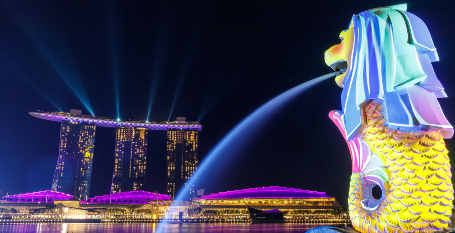Singapore's queer community has come together for the first Pink Dot celebration since the decriminalisation of homosexuality.
Held on 24 June, thousands of people wearing pink clothing and waving rainbow flags gathered in Hong Lim Park - a celebration of queerness that has been regularly held since 2009.
The theme of the event was A Singapore for All Families – a challenge to the argument that decriminalising gay sex would erode “family values” in the country.
When the gay sex ban was officially lifted in November, the Singaporean parliament also amended the constitution, to bolster the definition of marriage as being between a man and woman.
What's life like for LGBTQ people in Singapore?
What's life like for LGBTQ people in Singapore? Let's take a look at some of the key equality indicators.
Ending the ban on gay sex
After a long campaign by Singapore's LGBTQ community, and in the face of a lot of opposition from religious and conservative leaders, Singapore's ban on gay sex was finally removed in 2022.
Are there anti-discrimination protections in place for LGBTQ people in Singapore?
Not really. There are some protections against hate-crimes, but not a comprehensive framework of protection against discrimination based on sexuality.
Is there Marriage Equality for LGBTQ people in Singapore?
No, there is no legal recognition of same-sex relationships.
One of the compromises for ending the ban on gay sex was that the definition of marriage was strengthened to explicit limit marriage to opposite-sex couples.
What's life like for LGBTQ people in Singapore?
Singapore is a socially conservative country, however there is a vibrant and visible LGBTQ community and a number of queer venues and events.
Why was homosexuality illegal in Singapore?
By taking advantage of regional instability and a power struggle within the Malaysian Sultanate, the British government colonised Singapore in 1819.
British control of the island included the introduction of the British legal system, which – at that time – included laws against sex between men.
Singapore became independent in 1965, but the colonial legal system remain in place.
Following a review of the Penal Code in 1938, the laws that policed sexual activity were documented within Section 377A of Singapore’s Penal Code. The laws meant that anal sex and oral sex were prohibited for everyone – heterosexual or homosexual. In 2007, amendments to the law specifically legalised anal sex and oral sex for heterosexual sexual encounters, but they remained criminalised for man-on-man sexual encounters. Sex between women isn’t covered by Section 377A and doesn’t appear to have ever been explicitly prohibited in Singapore law.
Although rarely enforced, the government resisted calls to repeal Section 377A until it finally agreed to do so in 2022.
Research into the archives of the British Government has shed some light on why Section 377A was originally enacted. A 1940 report to the British Government official responsible for the administration of Singapore reveals a direct link between the enactment of Section 377A and the colonial administration’s concerns about its Singapore officials’ extensive use of male prostitutes at that time. The 1940 report details disciplinary action taken against government officials in 1938 – the year that Section 377A came into effect. This suggests that Section 377A was designed to regulate and control prostitution rather than what was happening in private between consenting adults, but the reality of this law has been the criminalisation of gay men.

